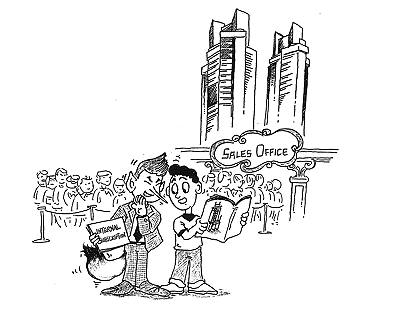 At a first sales office, Mr Chun spent a long time looking at the flats on offer. He came to the conclusion that, according to the scale model displayed at the sales office and the orientation of the blocks, Flat 28B in Block 8 would be the best choice for him. Unfortunately, the salesperson said that Block 8 had not yet been put up for sale. At a first sales office, Mr Chun spent a long time looking at the flats on offer. He came to the conclusion that, according to the scale model displayed at the sales office and the orientation of the blocks, Flat 28B in Block 8 would be the best choice for him. Unfortunately, the salesperson said that Block 8 had not yet been put up for sale.
As the disappointed Mr Chun was leaving, a man claiming to be an employee of estate agency A Co approached him and started a conversation. The man intimated that he could fulfil Chun's wish to buy the flat of his choice through internal subscription, on condition that, in addition to commission, Mr Chun would pay $50,000 as "internal subscription fee". He also suggested that there was work to be done to get Mr Chun the flat and asked Mr Chun not to enquire where the "internal subscription fee" would go to and that he should leave the payee of his cheque blank.
Thirty minutes later, when Mr Chun left the sales office, he had a certificate of priority subscription for the flat of his choice in his hand, whereas the man who claimed to be an employee of A Co had pocketed a cheque for $50,000 and a $300,000 cashier's cheque in favour of the solicitors acting for the developer. As to commission, the man said that A Co would issue an invoice later.
Three days later, Mr Chun learned from the developer that it had never instructed any agent to invite internal subscription. The certificate he had in hand was void. He also found that the person who took his money was not a staff member of A Co. Thirdly, the $300,000 cashier's cheque could not be traced, while the cheque for $50,000 had of course been cashed and the money pocketed by the swindler.
In trying to purchase the flat of his choice, Mr Chun completely neglected a number of precautionary measures. He should have checked with the developer first as to whether there was internal subscription and whether it had instructed A Co to invite such subscriptions. He should also have checked with A Co on the identity of the "employee". He should not have paid any sum of money to a man of unknown identity. What is even more serious is that Mr Chun might have incurred criminal liability by contravening the Prevention of Bribery Ordinance.
The Practice Regulation provides that estate agents shall inform their clients that they are licensed and of their licence numbers. If the identity of any estate agent is in doubt, the consumer may check the register of licensees at the offices of the Estate Agents Authority or at its website.
|